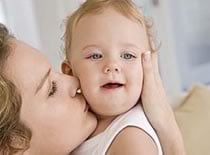What is this new flu virus?
 This novel H1N1 flu virus (sometimes called “swine flu”) was first detected in people in April 2009 in the United States. This virus is spreading from person-to-person, probably in much the same way that regular seasonal influenza viruses spread.
This novel H1N1 flu virus (sometimes called “swine flu”) was first detected in people in April 2009 in the United States. This virus is spreading from person-to-person, probably in much the same way that regular seasonal influenza viruses spread.
What can I do to protect my baby?
Take everyday precautions . In addition, take extra care to wash your hands often with soap and not to cough or sneeze in the baby’s face while feeding your baby, or any other time you and your baby are close. If you are ill, or coughing and sneezing, consider wearing a mask.
Does breastfeeding protect babies from this new flu virus?
There are many ways that breastfeeding and breast milk protect babies’ health. Since this is a new virus, we don’t know yet about protection specific against it. Mothers pass on protective antibodies to their baby during breastfeeding. Antibodies are a type of protein made by the immune system in the body. Antibodies help fight off infection.
Flu can be very serious in young babies. Babies who are not breastfed get sick from infections like the flu more often and more severely than babies who are breastfed.
Should I stop breastfeeding my baby if I think I have come in contact with the flu?
No. Because mothers make antibodies to fight diseases they come in contact with, their milk is custom-made to fight the diseases their babies are exposed to as well. This is really important in young babies when their immune system is still developing. Breastfeeding also helps the baby to develop his own ability to fight off diseases.
Is it ok to breastfeed my baby if I am sick?
Yes. This is really important.
- Do not stop breastfeeding if you are ill. Ideally babies less than about 6 months of age should get their feedings from breast milk. Breastfeed early and often. Limit formula feeds as much as possible. This will help protect your baby from infection.
- If you are too sick to breastfeed, pump and have someone give the expressed milk to your baby.
If my baby is sick, is it okay to breastfeed?
 Yes. One of the best things you can do for your sick baby is keep breastfeeding.
Yes. One of the best things you can do for your sick baby is keep breastfeeding.
- Do not stop breastfeeding if your baby is ill. Give your baby many chances to breastfeed throughout the illness. Babies who are sick need more fluids than when they are well. The fluid babies get from breast milk is better than anything else, even better than water, juice, or Pedialyte® because it also helps protect your baby’s immune system.
- If your baby is too sick to breastfeed, he or she can drink your milk from a cup, bottle, syringe, or eye-dropper.
- If no expressed milk is available, you can give your baby milk donated by other mothers to a HMBANA-certified milk bank
 .
.
Is it okay to take medicine to treat or prevent novel H1N1 flu while breastfeeding?
Yes. Mothers who are breastfeeding should continue to nurse their babies while being treated for the flu.
Please check back to the CDC H1N1 website often for the most recent updates.


